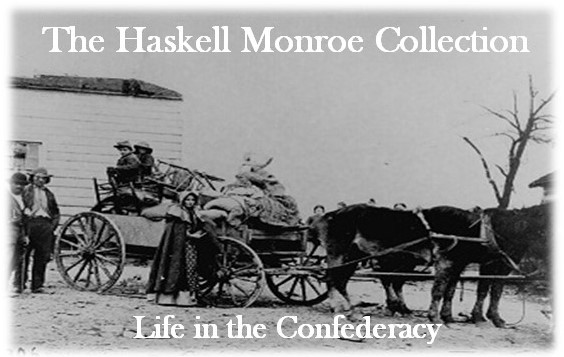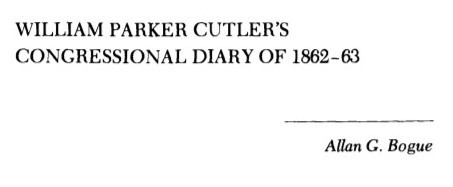William Parker Cutler's Congressional Diary Of 1862-63
Dublin Core
Title
William Parker Cutler's Congressional Diary Of 1862-63
Description
WILLIAM PARKER CUTLER'S CONGRESSIONAL DIARY OF 1862-63 Allan G. Bogue William Parker Cutler's career in the first United States Congress of the Civil War appears at first glance to have been less than noteworthy. Elected as a Republican to the House of Representatives from the 16th District of Ohio in 1860, Cutler first assumed his legislative duties at the beginning of the emergency summer session of 1861. In that body, he proposed that the proportion of taxes to be levied on real estate in the increased revenue bill should be decreased but later withdrew his amendment to that end.1 During the long second session of this Congress, Cutler reported four actions of the Committee on Invalid Pensions and submitted a resolution allowing the messenger of the sergeant at arms of the House to act for his principal while the latter was absent because of "severe family afflictions ." He also proposed two amendments to the Internal Revenue bill, providing in the one instance that no tax should be levied on railroads that had not paid dividends and a second designed to exempt promissory notes, drafts, or orders of fifty dollars or less from the action of the law. Neither of these proposals, however, was accepted. In the debate on the Pacific Railroad bill, Cutler interjected a short explanatory statement about the western railroad surveys. On April 23, 1862, he delivered an extended speech in the debate on confiscation in which he called strongly for the destruction of slavery. This contribution terminated his activity on the floor during the second session of the Thirty-seventh Congress.2 1 William ParkerCutler's political career is summarized in the Biographical Directory of the American Congress, 1774-1961 (Washington: Government Printing Office, 1961), 769-70. Additional information is found in Julia P. Cutler, Life and Times of Ephraim Cutler prepared from his journals and correspondence . . . withBiographicalSketches ofJervisCutlerandWiUiamParkerCutler(Cincinnati,1890).280-318;andGeorgeB]azier et al., The Cutler Collection of LettersandDocuments, 1748-1925: Letters and other memorabilia of Manasseh Cutler, 1742- 1823, Ephraim Cutler, 1767-1853, William Parker Cutler, ¡812- ¡889Julia Perkins Cutler. 1814- 1904 and theirRelatives and associates (Marietta : Marietta College, 1962-63), 55-69. 2 Congressional Globe, 37th Cong., ist sess., (1861), 282-83; 2d sess., 1(1861-62), 1084, 1483, 1513, 1680, 1798, 1912, 1925, Appendix, 114-18. Civil War History, Vol. XXXIII, No. 4, ® 1987 by The Kent State University Press 316CIVIL WAR history Cutler's sole contribution to the columns of the Globe during the debates of the third session were the words "Mr. Speaker," uttered just as Thaddeus Stevens, chairman of the Committee of Ways and Means, rose to claim the floor.3 If he only spoke once at length during the Thirty-seventh Congress, the Ohioan voted conscientiously and usually in concert with the more radical Republican members when that distinction was a valid one.4 He chaired no committee, whether standing or select, during this Congress, however, and regarding the provision of a railroad bridge across the Ohio River at Parkersburg as his greatest legislative contribution. Running for reelection in 1862 in a district that had been reapportioned following the federal census of 1862, he met defeat. He never again held a major political office. There was, of course, a good deal more than this to Cutler's life story. Grandson of the famous Manasseh Cutler and son of a leading citizen of southeastern Ohio, William Parker Cutler served as a Whig in the Ohio Assembly for several years during the mid-1840s, occupying the speaker's chair during his last incumbency. He represented his district in the Ohio Constitutional Convention of 1850 and at one point was considered to be gubernatorial material. Firmly committed to an antislavery position at an early stage of his political career, he embraced the emergent Republican party enthusiastically. As an active Presbyterian layman, he endeavored to force southern representatives in the national councils of that denomination into formal opposition to the institution of slavery. Himself a graduate of Ohio University, Cutler served on the Board of Trustees of Marietta College for some forty years. Cutler was a landholder and farmer, but he became a regional railroad promoter during the 1850s, serving as chief executive officer and...
Creator
Allan G. Bogue
Date
1987
Language
en
Type
Journal Article
Zotero
Title
William Parker Cutler's Congressional Diary Of 1862-63
Publication Title
Civil War History
Volume
33
Issue
4
Date
1987
Pages
315-330
Item Type
Journal Article
DOI
10.1353/cwh.1987.0046
ISSN
1533-6271
Access Date
2020-06-10 13:24:37
Extra
Publisher: The Kent State University Press
Language
en
Library Catalog
Project MUSE
Collection
Citation
Allan G. Bogue, “William Parker Cutler's Congressional Diary Of 1862-63,” The Haskell Monroe Collection: Life in the Confederacy , accessed March 4, 2026, https://library.missouri.edu/confederate/items/show/2588.

